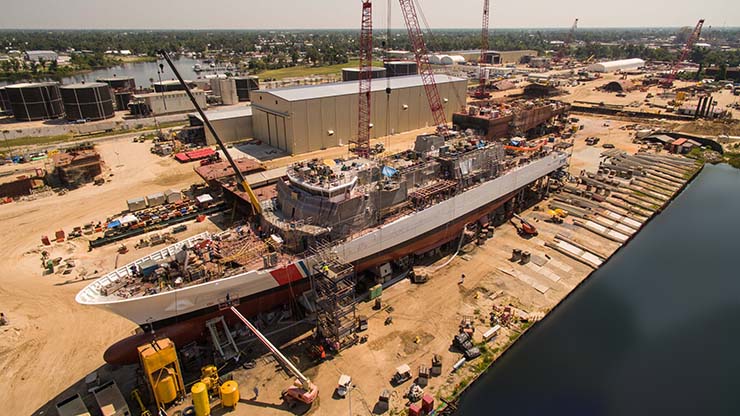
Washington: Independent government auditors are warning Congress that a combination of poor shipbuilding policy choices and lingering effects of a devastating 2018 hurricane are threatening to snowball the costs of the Coast Guard’s Offshore Patrol Cutter (OPC) program and push its schedule further off course.
“The OPC program continues to move forward with construction despite an unstable design, among other issues. Specifically, the Coast Guard began construction of the first four OPC ships without ensuring the shipbuilder sufficiently matured the OPC’s critical technology — the davit — and stabilized its design,” according to the report published. “This has already resulted in rework during OPC construction, and the effect will likely compound as production progresses on all four ships.”
The Offshore Patrol Cutter is a top Coast Guard shipbuilding program envisioned to deliver a fleet of 25 ships that will replace the service’s aging fleet of 210-foot and 270-foot Medium Endurance Cutters. The first stage of the program included awarding construction of the first four ships to the Florida-based Eastern Shipbuilding Group.
The watchdog found the “total acquisition cost estimate” for the program increased from $12.5 to $17.6 billion between 2012 and 2022 as well as racking up a one-and-a-half-year delay for the delivery of the first four ships.
“The program attributes the 40 percent [cost] increase to many factors, including restructuring the stage 1 contract and recompeting the stage 2 requirement in response to a disruption caused by Hurricane Michael, and increased infrastructure costs for homeports and facilities, among other things,” according to the report.
Another key issue GAO says is the davit — a crane used to deploy and retrieve small boats from the cutter — that has not yet proven itself effective and the service’s failure to develop a plan to remedy that issue. Additionally, auditors say Coast Guard shipbuilding policies may be threatening the program’s chances of success.
“Specifically, the Coast Guard does not require completion of basic and functional design and maturity of all critical technologies, as GAO previously recommended. It also does not require completion of the design of distributive systems — systems that affect multiple zones of the ship — prior to construction of the lead ship,” according to the report. “Significant rework can occur late in construction, resulting in subsequent cost growth and delays, if design of distributive systems are not completed prior to construction.”
-The writer is a Delhi-based freelance journalist who has been connected with the various national and international newspapers for three decades.









